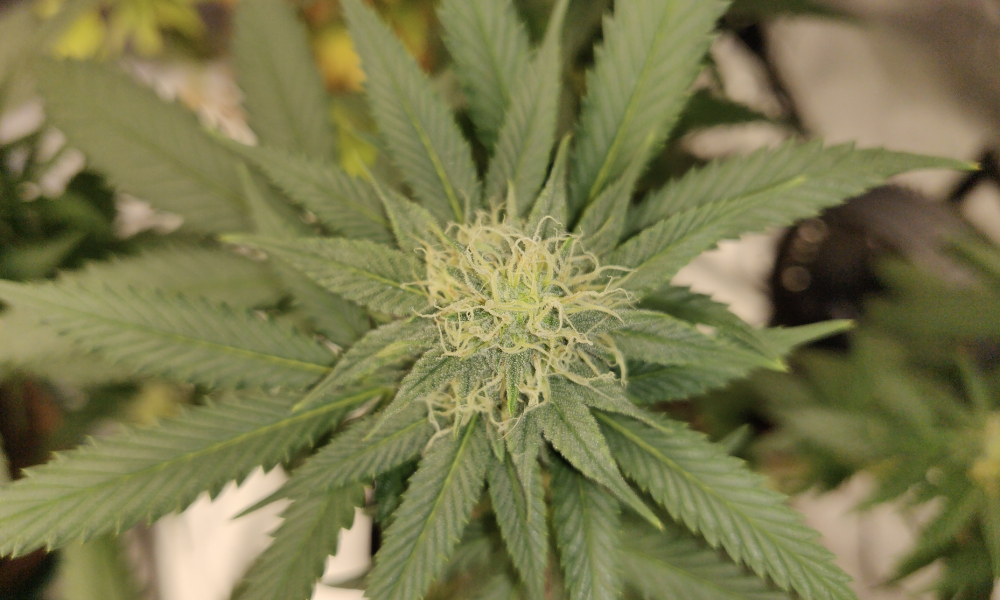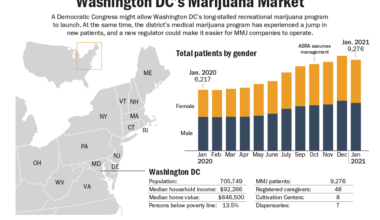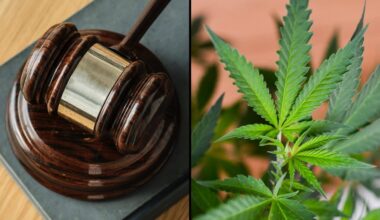Senators on a key Judiciary subcommittee are set to hold a hearing on marijuana reform on Tuesday—and the witnesses include former federal cannabis prisoner Weldon Angelos and anti-marijuana proselytizer Alex Berenson.
The Judiciary Subcommittee on Criminal Justice and Counterterrorism, chaired by Sen. Cory Booker (D-NJ), has five witnesses scheduled to testify, according to a list obtained by Marijuana Moment.
The list has not been formally announced by the panel yet, and representatives of the chair and ranking member did not immediately respond to emails from Marijuana Moment.
Here’s the list of witnesses for the hearing, titled “Decriminalizing Cannabis at the Federal Level: Necessary Steps to Address Past Harms.”
MAJORITY WITNESSES:
Malik Burnett, a pro-legalization physician who formerly worked for the Drug Policy Alliance (DPA) and previously testified in favor of reform before the U.S. House of Representatives. He currently serves as the medical director of harm reduction services at the Maryland Department of Health.
Weldon Angelos, a former federal marijuana prisoner who received a presidential pardon under the Trump administration and has continued to push for clemency for other people with federal cannabis convictions through his organization The Weldon Project.
Edward Jackson, chief of police at the Annapolis Police Department and a speaker at the pro-reform group Law Enforcement Action Partnership (LEAP).
MINORITY WITNESSES:
Steve Cook, former federal prosecutor who previously served as president of the National Association of Assistant United States Attorneys. Known as a drug warrior who supports taking a carceral approach in criminal justice, Cook was appointed by then-Attorney General Jeff Sessions to work in DOJ as associate deputy attorney general and led a marijuana review panel for the department ahead of the Trump administration’s rescission of Obama-era cannabis enforcement memos.
Alex Berenson, former New York Times reporter who has faced ample criticism over his questionable research linking marijuana use to serious mental illness and violent crime, and who was at one point banned from Twitter for claims he made about COVID-19 vaccines.
The choice of witnesses offers a preview of the kind of debate that the majority and minority will take up at the hearing. And the fact that Berenson was picked by Senate Republicans to go before the panel signals that there will be diametrically opposed perspectives represented at the meeting.
More specifically, it hints that there will be drama, as Berenson is not a person who’s known for subtlety and has became notorious on social media for offering contrarian takes on current events, particularly as they concern marijuana and COVID.
Tell Your Children – I’ll be testifying tomorrow about cannabis legalization before the Senate Judiciary Committee’s subcommittee on crime.https://t.co/nMMxT2uqA7
— Alex Berenson (@AlexBerenson) July 25, 2022
He’s the author of the 2019 book “Tell Your Children: The Truth About Marijuana, Mental Illness, and Violence,” which essentially argues that cannabis use causes psychosis, psychosis causes violence, ergo marijuana causes violence. The book, peppered with extreme examples of crime being committed by people allegedly under the influence of cannabis, has been routinely cited by prohibitionists and anti-reform lawmakers who oppose legalization.
It’s also been routinely dismissed by advocates and scholars who’ve accused Berenson of cherry-picking data to support a contrarian narrative that’s raised his national profile and earned him spots on Fox News.
In any case, the panel is chaired by Booker, one of the three prime sponsors of a newly released federal legalization bill that’s expected to be a centerpiece of the subcommittee’s discussion. While the two anti-reform witnesses will have a seat at the table, the hearing is focused on the path forward for federal marijuana policy, not upholding the status quo of prohibition.
Booker, Senate Majority Leader Chuck Schumer (D-NY) and Senate Finance Committee Chairman Ron Wyden (D-OR) filed the long-awaited Cannabis Administration and Opportunity Act (CAOA) last week, more than a year after unveiling a draft version. It quickly gained two new cosponsors, including the third-highest-ranking Senate Democratic, Assistant Majority Leader Patty Murray (D-WA).
But while the legislation will likely be taken up by the panel, there’s a general understanding among advocates and lawmakers that it’s unlikely to be enacted this Congress given the daunting 60-vote threshold it would need to pass through the Senate. Not all Democrats were on board with the draft proposal, and GOP members would likely oppose it.
In any case, Tuesday’s hearing could give an updated sense of where members across the aisle currently stand on reform and what they’re willing to advance as Americans grow increasingly frustrated over the ongoing federal criminalization of cannabis.
Schumer, for his part, said last week that he is committed to working with bipartisan offices to get “something” done on cannabis reform “this year.” He’s seemed to leave the door open to using provisions of CAOA as the basis for an incremental marijuana reform package that he’s been discussing with bipartisan and bicameral offices.
Another complication in enacting broad legalization is President Joe Biden, who maintains a stiff opposition to the policy change. Instead, he’s campaigned on modest changes such as decriminalization, rescheduling and continuing to allow states to set their own policies.
After more than a year in office, however, he’s yet to take any meaningful steps to make good on those campaign pledges. And days before the House passed the MORE Act in April, then-Press Secretary Jen Psaki reaffirmed that Biden’s position on legalization has not changed.
That said, the White House drug czar recently said that the Biden administration is “monitoring” states that have legalized marijuana to inform federal policy, recognizing the failures of the current prohibitionist approach.
The president also made his first substantive comments on cannabis policy this month, reaffirming to reporters that he doesn’t believe that people should be in prison over marijuana and stating that his administration is “working on” cannabis clemency issues.
Photo courtesy of Mike Latimer.
Medical Disclaimer:
The information provided in these blog posts is intended for general informational and educational purposes only. It is not a substitute for professional medical advice, diagnosis, or treatment. Always seek the advice of your physician or other qualified healthcare provider with any questions you may have regarding a medical condition. The use of any information provided in these blog posts is solely at your own risk. The authors and the website do not recommend or endorse any specific products, treatments, or procedures mentioned. Reliance on any information in these blog posts is solely at your own discretion.







